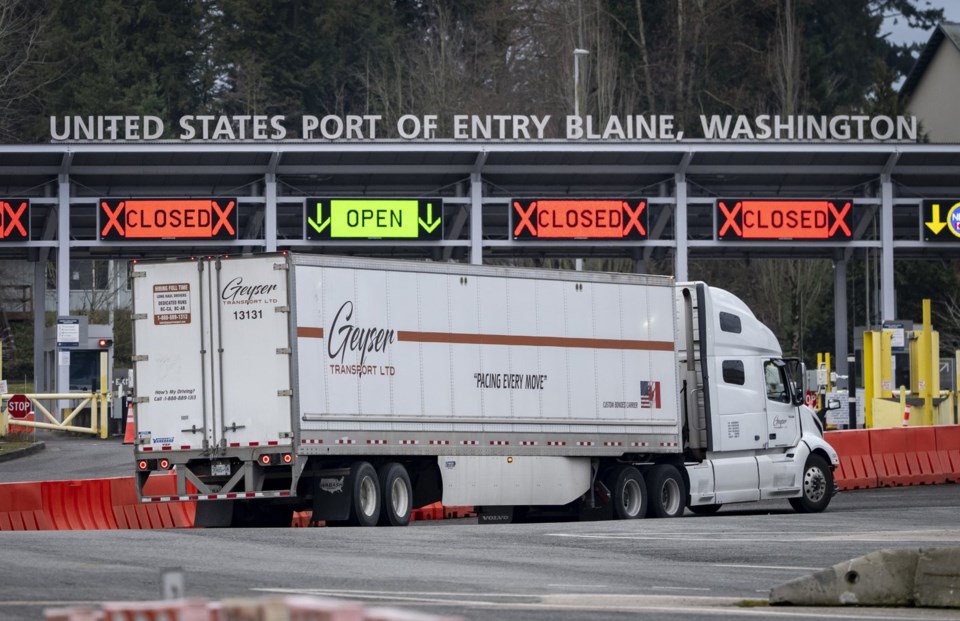OTTAWA — Proposed federal legislation would give authorities new powers to search mail, make it easier for officials to pause or cancel immigration applications and expand the Canadian Coast Guard’s role to include security activities.
Public Safety Minister Gary Anandasangaree introduced the Strong Borders Act in the House of Commons on Tuesday.
The government says the wide-ranging, 127-page bill aims to keep borders secure, combat transnational organized crime, stop the flow of deadly fentanyl and crack down on money laundering.
"To be truly strong, Canada must be secure," Anandasangaree told reporters. "That is why I'm asking all parties to come together to support this very important legislation."
The bill is part of Ottawa's effort to persuade U.S. President Donald Trump that Canada is doing enough to stem the southbound flow of drugs and migrants. Trump used claims about cross-border fentanyl traffic and irregular migration to justify imposing tariffs on Canadian imports.
"Canada will continue to work with our U.S. partners to ensure that our border remains secure, while we continue to manage the legitimate and efficient movement of people and goods between our countries," Anandasangaree said.
"The additional measures we're taking today to further secure Canada's border will help sustain the security and economic partnership for many years to come."
Anandasangaree said the legislation strikes a balance between increasing powers for agencies and protecting individual freedoms and rights.
NDP public safety and immigration critic Jenny Kwan disagreed with the minister, saying the bill "should be alarming to many Canadians" because it would allow the government to breach civil liberties.
The proposed legislation would, among other things:
— require owners and operators at certain ports to provide facilities for the Canada Border Services Agency to examine and detain goods bound for export;
— remove barriers that prevent police from searching mail to advance a criminal investigation, where authorized to do so under the law;
— expand Canada Post's inspection authority to open mail;
— protect the refugee system against sudden increases in claims by introducing new ineligibility rules, and strengthen the ability to cancel, suspend or stop accepting new applications;
— authorize Immigration, Refugees and Citizenship Canada to share client information, such as identity, status and immigration documentation, with federal, provincial and territorial partners through agreements;
— allow the Coast Guard to conduct security patrols and collect, analyze and circulate information and intelligence for security purposes;
— enhance the ability of the RCMP to share information collected on registered sex offenders with domestic and international partners;
— facilitate police access to basic information and data and amend the law governing the Canadian Security Intelligence Service to bolster the spy service's investigative tools;
— ensure that electronic service providers support the police and CSIS in criminal and intelligence investigations by compelling them to fulfil legally authorized requests to access or intercept information and communications;
— enable the health minister to more rapidly control precursor chemicals that can be used to produce illicit drugs;
— introduce new restrictions on large cash transactions and "third party deposits."
Kwan said she was particularly concerned about the planned powers to share immigration-related information and cancel applications already in the system.
She said a prospective newcomer to Canada could follow the required steps and "out of the blue, after this bill passes, the government can then just decide, 'I'm sorry, I'm just going to withdraw your application. I'm going to suspend your application. I'm just going to deny your application.'
"Is that striking a fair balance of civil liberties? I think not."
Syed Hussan, a spokesperson for the Migrant Rights Network, called the bill a shameful capitulation to racism and xenophobia that abandons Canada's legal and moral obligations.
The group noted the bill prohibits migrants who have been in Canada for more than one year from making refugee claims, with retroactive application to anyone who arrived after June 24, 2020.
"This means individuals whose home countries deteriorate into conflict after their arrival would be denied the right to seek asylum protections simply due to timing," the group said in a media statement. "This is a complete abandonment of international humanitarian law."
The new legislation builds on earlier Canadian border security measures, including the introduction of round-the-clock border surveillance using helicopters, drones and surveillance towers.
Ottawa is also working with Washington on a North American "joint strike force" to target organized crime groups that work across borders.
— With files from Alessia Passafiume and David Baxter
This report by The Canadian Press was first published June 3, 2025.
Jim Bronskill, The Canadian Press



